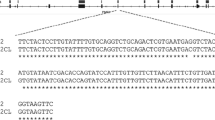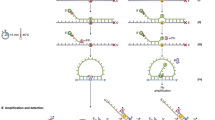Abstract
In order to investigate allele loss in colorectal tumours we have developed a rapid technique which overcomes most of the problems associated with radioactive Restriction Fragment Length Polymorphism (RFLP) analysis of allele loss. We utilise microsatellite length polymorphisms which are highly informative and are closely linked to loci of interest. Sequences containing microsatellites can be amplified from normal and tumour DNA pairs by a polymerase chain reaction (PCR) in which one of the primers is fluorescently labelled. This enables us to detect the products on polyacrylamide gels run on an automated DNA sequencer using dedicated software, by which results are automatically quantitated in terms of peak size, height, and area. Using this technique we have analysed 26 normal tissue: cancer pairs for allele loss at two loci linked to the adenomatous polyposis coli (APC) gene on chromosome 5q. Repeated assays yielded identical results for each pair. Allele loss was found in 10 out of 25 informative samples (40%).
This is a preview of subscription content, access via your institution
Access options
Subscribe to this journal
Receive 24 print issues and online access
$259.00 per year
only $10.79 per issue
Buy this article
- Purchase on Springer Link
- Instant access to full article PDF
Prices may be subject to local taxes which are calculated during checkout
Similar content being viewed by others
Author information
Authors and Affiliations
Rights and permissions
About this article
Cite this article
Cawkwell, L., Bell, S., Lewis, F. et al. Rapid detection of allele loss in colorectal tumours using microsatellites and fluorescent DNA technology. Br J Cancer 67, 1262–1267 (1993). https://doi.org/10.1038/bjc.1993.236
Issue Date:
DOI: https://doi.org/10.1038/bjc.1993.236
This article is cited by
-
Loss of heterozygosity for chromosomal regions 15q14-21.1, 17q21.31, and 13q12.3-13.1 and its relevance for prostate cancer
Medical Oncology (2015)
-
Chromosomal imbalances exclusively detected in invasive front area are associated with poor outcome in laryngeal carcinomas from different anatomical sites
Tumor Biology (2013)
-
Frequency, molecular pathology and potential clinical significance of partial chromosome 3 aberrations in uveal melanoma
Modern Pathology (2011)
-
Involvement of GTA protein NC2β in Neuroblastoma pathogenesis suggests that it physiologically participates in the regulation of cell proliferation
Molecular Cancer (2008)
-
Cytogenetic alterations in ovarian clear cell carcinoma detected by comparative genomic hybridisation
British Journal of Cancer (2003)



